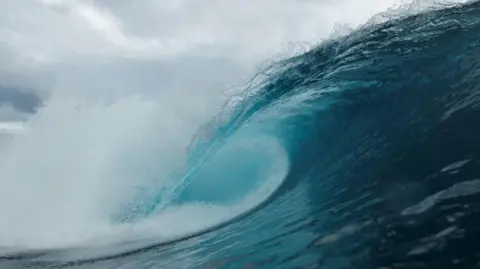'Ocean darkening' a cause for concern - scientists
 Reuters
ReutersMore than a fifth of the global ocean has become darker over the past two decades, according to University of Plymouth research.
The process, known as "ocean darkening", occurs when changes to the ocean's upper most level reduce the depth at which sunlight can travel.
The study, published in Global Change Biology, found 21% of the global ocean had become darker between 2003 and 2022.
Reasons for ocean darkening were believed to be down to factors such as changes in algal bloom dynamics, shifts in sea surface temperatures and artificial light, researchers said.
The study found more than 9% of the ocean - an area similar in size of Africa - had seen a reduction in light by more than 164ft (50m).
A further 2.6% of the ocean saw a reduction of more than 328ft (100m), it said.
While the precise implications of the changes were not wholly clear, researchers said large numbers of the planet's marine species and ecosystem services could be affected.
Dr Thomas Davies, associate professor of Marine Conservation at the university, said: "There has been research showing how the surface of the ocean has changed colour over the last 20 years, potentially as a result of changes in plankton communities.
"But our results provide evidence that such changes cause widespread darkening that reduces the amount of ocean available for animals that rely on the sun and the moon for their survival and reproduction."
'Fundamental changes'
Dr Davies said ocean darkening could have an impact on the air humans breathe, the fish they eat and the world's ability to fight climate change.
"Our findings represent genuine cause for concern," he said.
Prof Tim Smyth, head of Science for Marine Biogeochemistry and Observations at the Plymouth Marine Laboratory, said some marine animals that need light could come closer to the surface as a result of the changes.
This would cause increased competition for food and the other resources, he warned.
"That could bring about fundamental changes in the entire marine ecosystem," he said.
Follow BBC Devon on X, Facebook and Instagram. Send your story ideas to [email protected].
